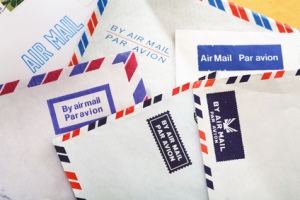 You’ve almost completed your blogged book, but no agents or publishers have come calling yet. You still would like to see if you can land a traditional publishing deal, especially since your blog has shown tremendous growth. In the months since you began blogging your book you’ve developed a strong platform consisting of a large subscriber base and an impressive number of unique visitors and page views. It’s time you called on those agents and publishers.
You’ve almost completed your blogged book, but no agents or publishers have come calling yet. You still would like to see if you can land a traditional publishing deal, especially since your blog has shown tremendous growth. In the months since you began blogging your book you’ve developed a strong platform consisting of a large subscriber base and an impressive number of unique visitors and page views. It’s time you called on those agents and publishers.
How do you begin? You need to send query letters to agents until you find one that wants to work with you on selling our project to a publisher. Or you can submit to some types of publishing houses without literary representation.
Only small, independent publishing houses accept “unagented” submissions, those sent in by an author rather than an agent. The mid-sized and large published houses require book proposals to by sent in by agents; these are called “agented” submissions.
The Two Necessary Documents You Need
Before you begin contacting any publishing professionals, you need two documents ready to go: a book proposal and a query letter.
If you have blogged a novel, you increase your odds of landing a publishing deal if you produce a proposal to go with your completed manuscript. More and more often, publishers require proposals for fiction, and writing one makes you stand out from the crowd. If you blogged a nonfiction book of any type, including memoir, a proposal is required. This includes only about 25 pages of your manuscript. (I’ll tell you more about how to produce a book proposal in my next post.)
No matter what type of book you blogged, you approach an agent or a publisher by sending out a query letter first. If the query letter attracts attention, you will be asked to send your proposal and/or manuscript. Yay! You’ve made it through the first pass!
You can see why your query letter must sell these publishing professionals on your idea, and on you—fast. You have just about a page to get the job done. It’s like a fast ball—a fast pitch. Indeed, that query contains the pitch for your book.
I explained how to write a query letter in a previous post. You can follow those instructions to produce a draft. Then revise and edit and possibly even get a professional editor or proofreader to take a look at it for you. That letter is the one thing that stands between you and getting to the next stage.
If your proposal convinces an agent your book idea is marketable, you will be offered an agency contract. That’s when the agent begins contacting publishers on your behalf and trying to sell your book. The agent will likely use some version of your initial query letter.
Increase Your Odds of Getting Your Query Noticed
Here are 6 tips to help submit successfully.
1. Research agents before submitting your query.
Publishers Marketplace lists more than 2,000 agents. If they don’t specify the subject areas they are interested in, visit their websites. Or check out the Association of Author Representatives and Agentquery.com. Go to each agent’s web page, learn about them, check out their submission guidelines, and choose the best agents for you and your project. Also see if you can personalize your letter to the agent.
2. Use a multiple-submission process.
Even if an agent specifies that he or she doesn’t accept multiple submissions, you should make this practice part of your submission process. You can choose to submit to these agents or not. It’s hard enough to find an agent with an unsolicited query. Increase your odds by querying several—or even many—at a time. Some agents get 4,000 queries or more per year. They may only respond to about 200 with a request for a proposal. Only 10 or 15 might be offered a contract. Yet, many deals come out of slush piles, which consist of unagented query letters.
3. Keep your query to one page.
Many query letters can’t hold an agent’s attention for more than a paragraph. Keep the letter short and to the point. Keep the majority of the information for the proposal. Realize that agents spend 10-20 seconds on your query deciding whether they want to follow up with you. Make sure those 10 seconds are used effectively. And don’t forget to make it easy for the agent to contact you.
4. Educate yourself.
Know how to write a good query letter. Know how to describe the genre of your book and the category where it would be placed in a store. Understand how traditional publishing works.
5. Don’t over promise or exaggerate.
Always be authentic and honest. Don’t say you can get a foreword from someone famous when you aren’t sure you can or 10 testimonials from celebrities when you don’t know any of them. Don’t say your book is the only one or the first or the best or that Oprah will be calling you. Just prove you have a marketable book.
6. Check your work.
Hire an editor or a proofreader, or at the very least have someone read over your letter (and your proposal) before you submit to agents. A letter filled with typos won’t get you very far or make good impression.
Read my next post to learn about how to get your book proposal noticed.
How to Craft a Proposal for a Book that Sells
A 6-week course on how to write a
business plan for a successful book
Learn how to write a book proposal that convinces agents and acquisitions editors your book is a viable product and that you make a good business partner so they are eager to work with you and to help bring your book to market. Also, discover how to use the “proposal process” as a creative one that helps you produce a book that will sell to a publisher and to readers upon release. Find out how developing a proposal can help you craft a successful career as an author as well as a success book no matter what type of book you write or how you decide to publish.
Receive more information and register by clicking on the button below.
Space is limited.
Image by Stocksnapper | stockfresh.com


I am so grateful for your article.Much thanks again.
vizio vbr200w blu ray player review
Does it make sense to send out query letters before the full proposal is ready?
No, Tyler, it doesn’t. You don’t want to make an agent wait. Send queries after your proposal is 99% ready. Give it a once over before you send.